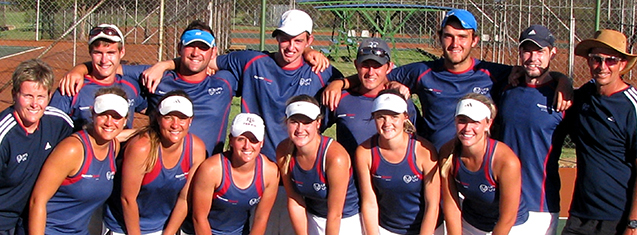Latest News Archive
Please select Category, Year, and then Month to display items
02 January 2025
|
Story Gerda-Marie van Rooyen
|
Photo Supplied
 Leading the research in South Africa is Prof Linus Franke from the Department of Soil, Crop and Climate Sciences.
Leading the research in South Africa is Prof Linus Franke from the Department of Soil, Crop and Climate Sciences.
Scientists are actively pursuing the successful breeding of diploid hybrid potatoes from inbred lines. This is expected to revolutionise potato breeding as it holds the key to rapid genetic progress. It will introduce new varieties for commercialisation through seed. Currently, existing potato variants have a gene that renders self-pollinated seeds infertile.
Prof Linus Franke, an academic in the Department of Soil, Crop and Climate Sciences at the UFS, is leading the research in South Africa. “This technology allows the production of genetically uniform potato seed that is easy to transport and largely disease-free.” He says this differs from conventional breeding whereby only vegetative propagation is possible due to tetraploid varieties in potatoes. It also risks carrying pests and diseases from one generation to the next – leading to the accumulation of pests and diseases with each round of multiplication.
Seed innovation
Prof Franke explains that Solynta BV, a seed company based in the Netherlands that produces potato varieties that can be grown from seed, has included South Africa in their research efforts because it is one of Africa’s largest producers and exporters. Through his academic relationship with Wageningen University and Research, a Dutch institution renowned for its agricultural endeavours and food production, the UFS became involved in researching hybrid potatoes grown from seed.
Diploid seeds containing two sets of chromosomes allow easier gene manipulation to increase predictability and speedier genetic progress. The breeding approach enables the incorporation of tolerance to pests, diseases, abiotic stresses (cold, heat, drought) and other desired genetic traits.
Although Prof Franke is optimistic about this research, he is not blind to disadvantages. “Potato seeds are tiny and have little energy reserves, making it harder to grow potatoes from seed than from tubers.” He says potatoes from seed will take longer to cultivate than tubers, as farmers need to grow plantlets from seeds first, adding six weeks to the growing period. “It is possible that commercial farmers can grow potatoes directly from seed. Alternatively, perhaps more likely, specialised growers will produce tubers of potatoes from seed; these tubers are then sold as seed tubers to other potato farmers, who then continue their normal practices of producing potatoes for the market from tubers.”
Financial benefits
Prof Franke says farmers have reason to get excited. “Seed potatoes will reduce input costs, as varieties with enhanced tolerance to pests and diseases require less pesticides. Planting one hectare of potatoes requires three to four tonnes of potato tubers, but only one 25 g packet of potato seeds.” Since potatoes are a more valuable commodity than maize, this technology might also increase farmers’ income potential.
KovsieTennis wins gold at USSA – again
2014-12-10

The annual University Sport South Africa (USSA) tournament was hosted by the KovsieTennis Club from 1 – 5 December 2014 in Bloemfontein.
This year was the first time that KovsieTennis entered two teams in the tournament. Our first team played in section A, while our second team competed in section B. Both sections were divided into two pools with round robin matches during the first three days. Thursday presented the cross-over with the finals taking place on that Friday.
During the round robin phase, our first team beat Rhodes University, University of Witwatersrand and University of Pretoria. On the Thursday, they met North West University (Pukke) in the semi-final and beat them 8-5 in matches. The last match was not played, since Kovsies already won the semi-final. For the third year in a row, Kovsies faced Stellenbosch University (Maties) in the final. After some brilliant tennis in sweltering heat, Kovsies found themselves 7-5 down in matches with the last two mixed doubles still to be played.
Janine Erasmus and Duke Munro, as number one couple, and Arne Nel and Heidi Murray, as number two couple, played outstanding mix doubles to win both matches, tying the score on 7-7. Due to the fact that Kovsies lost three of their matches in three sets they were crowned champions, winning with 17-14 on sets.
It is the eighth year in a row that the Kovsie club managed to win gold during USSA. We are also the only team that has won the tournament since the format changed to combined teams from 2010.
After the tournament Arne Nel, Duke Munro and Christi Potgieter were included in the squad from which a team will be selected, should tennis feature at the World Student Games in Korea during July 2015. Janine de Kock , KovsieTennis manager, was also appointed as manager of the SA Student team and Marnus Kleinhans from Kovsies will be their coach.
The second team beat Tshwane University of Technology, University of Kwa-Zulu- Natal and University of Cape Town during the round robin and in the semi-finals they won against University of Pretoria. Unfortunately they lost in the final against the North West University, but the club is extremely proud of the players since it was the first time all of them played in a USSA tournament. They gained a lot of experience that will greatly contribute to the value they will add to the team next year.